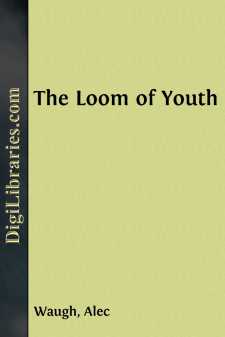Categories
- Antiques & Collectibles 13
- Architecture 36
- Art 48
- Bibles 22
- Biography & Autobiography 813
- Body, Mind & Spirit 142
- Business & Economics 28
- Children's Books 17
- Children's Fiction 14
- Computers 4
- Cooking 94
- Crafts & Hobbies 4
- Drama 346
- Education 46
- Family & Relationships 57
- Fiction 11829
- Games 19
- Gardening 17
- Health & Fitness 34
- History 1377
- House & Home 1
- Humor 147
- Juvenile Fiction 1873
- Juvenile Nonfiction 202
- Language Arts & Disciplines 88
- Law 16
- Literary Collections 686
- Literary Criticism 179
- Mathematics 13
- Medical 41
- Music 40
- Nature 179
- Non-Classifiable 1768
- Performing Arts 7
- Periodicals 1453
- Philosophy 64
- Photography 2
- Poetry 896
- Political Science 203
- Psychology 42
- Reference 154
- Religion 513
- Science 126
- Self-Help 84
- Social Science 81
- Sports & Recreation 34
- Study Aids 3
- Technology & Engineering 59
- Transportation 23
- Travel 463
- True Crime 29
The Loom of Youth
by: Alec Waugh
Categories:
Description:
Excerpt
PREFACE TO NEW EDITION
Books have their fates and this one's has been curious. I wrote it between January and March 1916, when I was seventeen and a half years old and in camp at Berkhamsted with the Inns of Court O.T.C. I loathed it there, everything about it, the impersonal military machine, the monotonous routine of drills and musketry, the endless foot-slogging, the perpetual petty fault-finding. I kept comparing my present life with that which I had been leading ten, eighteen, thirty months ago at Sherborne, as a schoolboy.
My four years there had been very happy. I was the kind of a boy who gets the most out of a public school. I loved cricket and football and was reasonably good at them. I was in the first XV and my last summer headed the batting averages. My father had lit in me a love of poetry and an interest in history and the classics. More often than not I went into a class-room looking forward to the hour that lay ahead. I enjoyed the whole competitive drama of school life—the cups and caps and form promotions. As I marched as a cadet over Ashridge Park I remembered that a year ago I had been bicycling down to the football field for a punt about on Upper. As I listened to a lecture on the establishment of an infantry brigade, I thought of the sixth form sitting under that fine scholar and Wordsworthian Nowell Smith to a discussion of Victorian poetry. In the evenings on my way to night operations, passing Berkhamsted School and looking at the lighted windows, I would think, "At Sherborne now they are sitting round the games study fire waiting for the bell to ring for hall". Day by day, hour by hour, I pictured myself back at school.
I was in a nostalgic mood, but I was also in a rebellious mood. Intensely though I had enjoyed my four years at Sherborne, I had been in constant conflict with authority. That conflict, so it seemed to me, had been in the main caused and determined by authority's inability or refusal to recognise the true nature of school life. The Public School system was venerated as a pillar of the British Empire and out of that veneration had grown a myth of the ideal Public School boy—Kipling's Brushwood Boy. In no sense had I incarnated such a myth and it had been responsible, I felt, for half my troubles. I wanted to expose it. Those moods of nostalgia and rebellion fused finally in an imperious need to relive my school days on paper, to put it all down, term by term, exactly as it had been, to explain, interpret, justify my point of view.
I wrote the book in six and a half weeks, getting up at half past four every morning and returning to my manuscript at night after the day's parades. I posted it, section by section, to my father who corrected the spelling and punctuation, interjected an occasional phrase and sent it to be typed. I never revised it. As the manuscript shows, it was printed as it was written, paragraph by paragraph.
The book after two or three refusals was accepted by Grant Richards and published in July 1917 in the same week that I was posted as a machine-gun second-lieutenant to the B.E.F....


